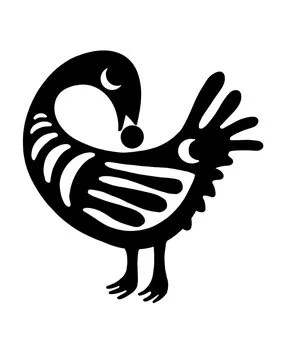
Recently, I learned about a beautiful and powerful symbol from Ghana called the Sankofa bird. This image comes from the rich heritage of the Akan people, and the word Sankofa comes from the Twi language—a combination of three words:
-
- San – to return
-
- Ko – to go
-
- Fa – to fetch or take
Put together, Sankofa means: “Go back and fetch it.” Or more deeply: “Return and bring forward what is valuable.”
The Sankofa bird is often pictured walking forward, yet with its head turned back, reaching toward its own back. In many depictions, it carries an egg or a seed in its beak—a symbol of life, potential, and the future.
It’s a striking reminder that as we move forward into what’s new, we sometimes need to look back—not to dwell there in regret or nostalgia, but to bring with us what is worth remembering, worth planting, worth passing on.
This image brought to mind the Apostle Paul’s words in Philippians 3:13–14: “But one thing I do: forgetting what lies behind and straining forward to what lies ahead, I press on toward the goal for the prize of the upward call of God in Christ Jesus.”
At first glance, Paul seems to suggest that the past should be left behind entirely. But if we look more closely at his life and letters, we see that he never ignored the past. He named it. He remembered his former way of life—his failures and his successes, his ignorance and his education, his zeal without love and his pastoral care for the early church.
Paul’s past wasn’t erased; it was redeemed. It became part of his testimony and his mission. In that way, he lived much like the Sankofa bird—moving forward in Christ, but carrying with him a seed from the past: a story, a truth, a transformed life to be planted for the future.
When it comes to “looking back,” I think there are two common, unhelpful ways we sometimes relate to our past:
-
- Looking back with nostalgia – “Everything was so good back then.” This can become an idealized and unrealistic picture, keeping us from growing or asking hard questions.
-
- Looking back with shame – “Everything was a failure.” This can weigh us down, trapping us in regret and convincing us we’re disqualified from being used by God.
God’s grace meets us in both places. His grace allows us to look back with honesty—naming both the beauty and the brokenness. His grace invites us to learn, to forgive, and to be forgiven. And most importantly, His grace enables us to carry something good forward: a seed of truth, a lesson in character, a reminder of love.
In this way, the Sankofa bird becomes a picture of Christian hope. It doesn’t go back to live in the past. It isn’t weighed down by what was. It moves forward with intention, carrying in its beak what is worth keeping—what is worth planting.
May we press on toward the upward call of God in Christ.
May we move forward, not forgetting our past, but allowing God to redeem it—so that even our past can bear fruit for the future.


